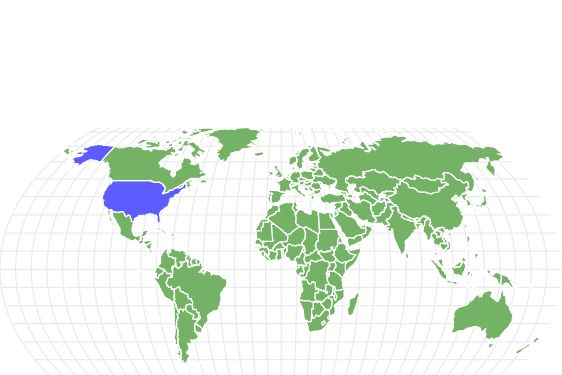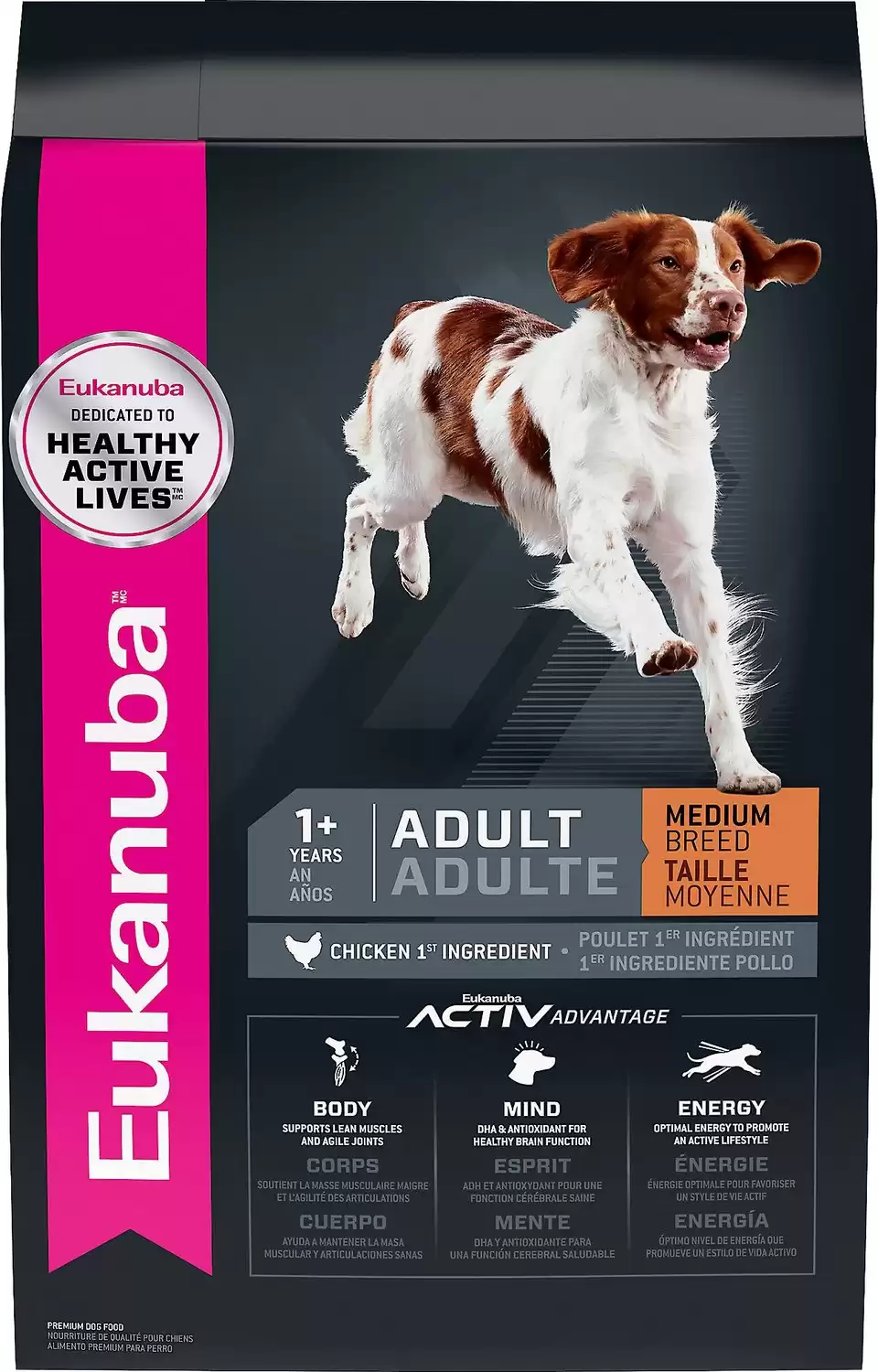Miniature Husky
Canis lupus
The Miniature Husky has a double coat that it sheds twice annually. Also, some people confuse them with Alaskan Klee Kai, which have similar blue eyes.
Advertisement
Miniature Husky Scientific Classification
- Kingdom
- Animalia
- Phylum
- Chordata
- Class
- Mammalia
- Order
- Carnivora
- Family
- Canidae
- Genus
- Canis
- Scientific Name
- Canis lupus
Read our Complete Guide to Classification of Animals.
Miniature Husky Conservation Status
Miniature Husky Facts
- Fun Fact
- The Miniature Husky has a double coat that it sheds twice annually. Also, some people confuse them with Alaskan Klee Kai, which have similar blue eyes.
- Temperament
- Energetic, athletic, playful, friendly, intelligent
Miniature Husky as a Pet:
- General Health
- Energy Level
- Shedability
- Trainability
- Intelligence
- Tendency to Chew
- Size
- Family and kid friendliness
- Yappiness / Barking
- Moderate
- Separation Anxiety
- High
- Preferred Temperature
- Warm climate
- Exercise Needs
- High
- Friendly With Other Dogs
- High
- Pure bred cost to own
- $1,500-$2,500
- Dog group
- Working
- Male weight
- 25-35 lbs
- Female weight
- 20-30 lbs
This post may contain affiliate links to our partners like Chewy, Amazon, and others. Purchasing through these helps us further the A-Z Animals mission to educate about the world's species.
View all of the Miniature Husky images!
A miniature Husky is a smaller version of the normal Siberian Husky. They have the same personality traits as the regular huskies and require special grooming to avoid shedding.
Much like regular Huskies, the miniature Siberian huskies attract attention wherever they go. They are smaller in size but behave the same as a standard Husky would. Miniature Huskies are known to be loyal. They are intelligent and are very energetic. Their smaller size is a boon to them as it allows them to fit in different lifestyles and situations easily. These dogs are known for their beautiful blue eyes.
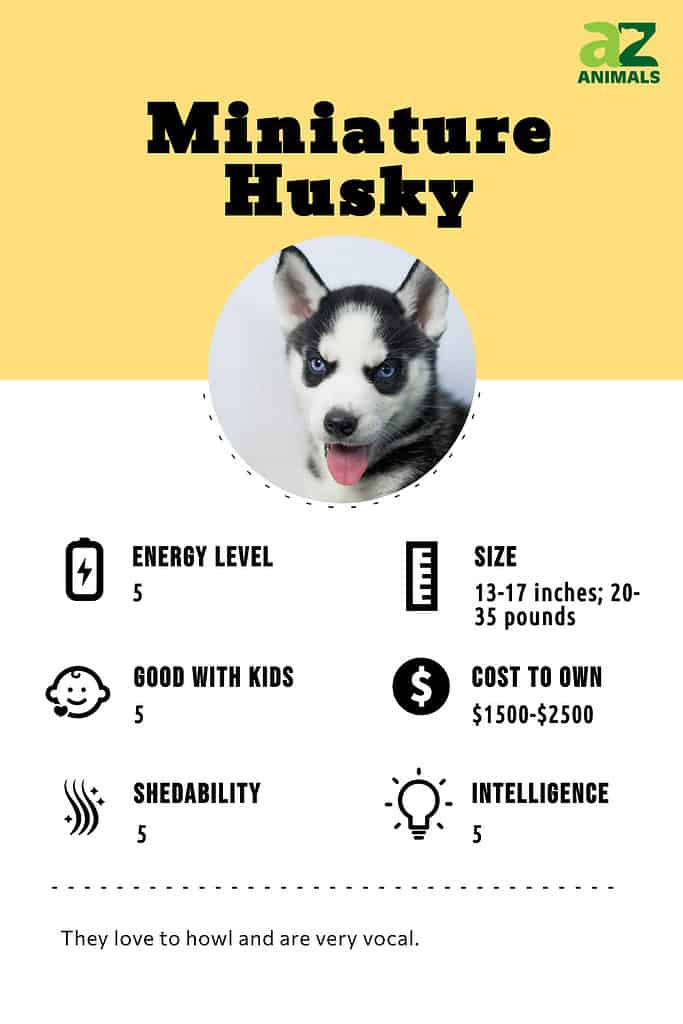
History Of The Breed
These dogs were first bred by breeder Bree Normandin in the 1990s. The breeder had taken standard-sized Siberian huskies that were of a smaller size and had bred them together until the miniature Husky was formed as a result. They are classified as working dogs. However, they are more of companion dogs for their owners. The lifespan of these dogs is about 12 to 15 years.
3 Pros And Cons Of Owning A Miniature Husky
Before you decide on having a pet in the house, get a realistic idea of what it is like to live with them. Here are a few advantages and disadvantages of the miniature Husky.
| Pros! | Cons! |
|---|---|
| Playful If you’re looking for a small, playful dog in the house, this one would be perfect for you. This breed is extremely playful and is loved by many for this reason. | Sheds a lot These dogs have a double coat which makes them shed a lot which sometimes makes it difficult for the owner. |
| Great companion While they are categorized as working dogs, miniature Huskies are known to be great companion dogs and will always be happy to tag along with their owners. | Destructive behavior When bored, miniature huskies can showcase destructive behaviors which can be difficult to control sometimes. |
| Very intelligent This breed is extremely intelligent which makes it easier for the owners to have them understood by the dog in various situations. | Not a good guard dog Between their friendliness and small size, the miniature husky is not particularly meant for keeping a home safe. |
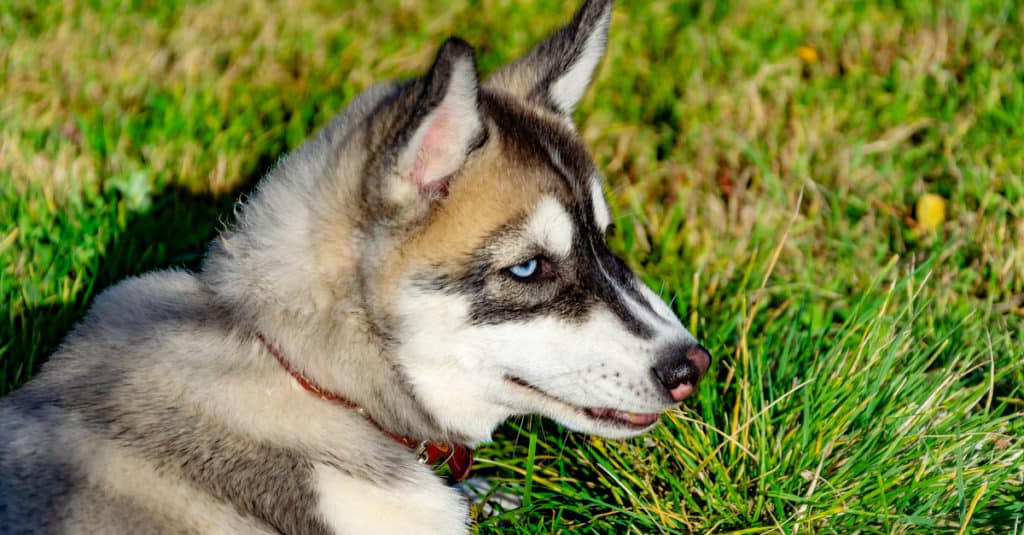
Miniature Huskies are extremely playful but may also be destructive.
©Taisya Korchak/Shutterstock.com
Size And Weight
Miniature Huskies may have the same appearance in their coat and even their mannerisms, but their small build is the main reason that they are different from the traditional Siberian Husky.
Full-grown males are usually 14 to 17 inches tall and weigh 25 to 35 pounds. Meanwhile, full-grown females stand between 13 to 16 inches and usually weigh about 20 to 30 pounds.
| Height (Male) | 14″-17″ |
| Height (Female) | 13″-16″ |
| Weight (Male) | 25-35 pounds |
| Weight (Female) | 20-30 pounds |
Common Health Issues
Even though they are a relatively healthy breed of dogs, they still have a few particular health issues. This breed is prone to issues like progressive retinal atrophy (which leads to blindness) and hypothyroidism (which leads to weight gain and obesity). Hip dysplasia is another common problem amongst this breed, which can cause painful arthritis as the hip socket diminishes in usability.
If at all possible, ask the breeder about any other health problems that you might need to know of. With all the health problems, the healthiest of miniature Huskies can still have a lifespan of 12 to 15 years.
Therefore, some of the problems that these dogs suffer from include:
- Hip dysplasia
- Hypothyroidism
- Progressive retinal atrophy
Temperament And Behavior
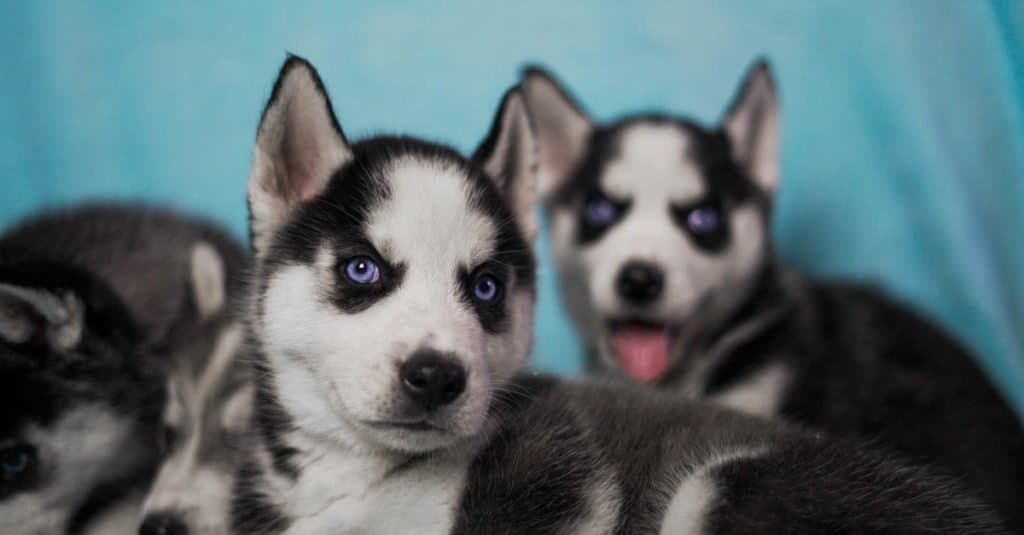
Miniature Huskies prefer to be active, both mentally and physically.
©Wirestock Creators/Shutterstock.com
Known for its beautiful blue eyes, this breed of dog is rather small but energetic. They do not like lying around all day. While they are excellent companions, they won’t hang around on your lap all day. They prefer to get in plenty of exercise, as they are fairly athletic and active all of the time. They are also highly intelligent, which means that the stimulation of their muscles is just as important as their mental engagement in activities. Their behavior is solely linked to the focus and physical exertion they can release.
The small pup’s overall temperament benefits when they have work to do. After all, their larger counterpart is bred to be working dogs! Since they are so obedient and social, they benefit greatly from socialization when they are young, which is easy to do at a dog park or regular walks around a pet-friendly neighborhood.
As patient as the mini-Husky is with dogs, they are even better with children. Their friendly nature makes them rather playful and fun, but any child will need supervision to ensure that they know the proper way to treat the animal.
Miniature huskies can be rather mischievous, but this issue can be curbed with consistent attention to their physical and intellectual needs. As playful as these animals are, they are not aggressive, which means that they shouldn’t be used as guard dogs. Instead of barking, these dogs usually make other noises like howls to communicate. All in all, miniature huskies make great family dogs.
How To Take Care Of A Miniature Husky
When you plan on getting a miniature Husky, their care is crucial to a longer lifespan and a healthy dog. There are few considerations to make, but the right preparation can make a world of difference. Whether it is the food they eat or the training that they need, here are a few considerations to make when bringing home a miniature husky for the first time.
The Best Dog Food For Miniature Huskies
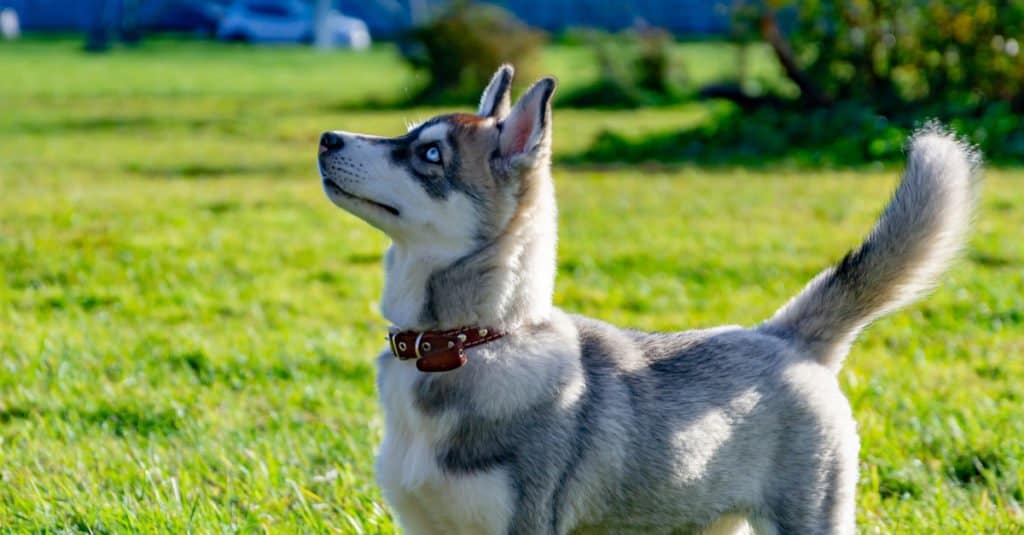
Miniature Huskies are energetic and require high-quality food that will support their energy levels.
©Taisya Korchak/Shutterstock.com
Even though the miniature Husky is small in size, their dietary needs are quite different from terriers and toy dogs. These dogs are energetic, so they will require high-quality food that can support their energy levels. Focus on finding foods that are low in fat and carbohydrates and high in protein, whether that comes in the form of dry foods, canned foods, or traditionally human foods.
If you aren’t sure which brand would suit your pet the best, consult a veterinarian. Their size and weight play a role as well.
At A-Z Animals, we think the best dog food for Miniature Huskies is Eukanuba Adult Medium Breed Dry Dog Food.
An ideal ratio of carbohydrates and fats supports this active breed and its energetic lifestyle. Also, the high-quality animal protein from chicken provides natural chondroitin sulfate and glucosamine to protect Miniature Huskies’ joints from issues like hip dysplasia. And the beta-carotene is a nutrient dogs need to maintain healthy eyes and good vision.
Eukanuba adult medium breed dry dog food is available on Chewy and Amazon.
- Adult medium breed dry dog food formulated with complete and balanced nutrition for medium breed dogs over 12 months old and weighing between 24-54 lb.
- Promotes lean muscle development and joint health in active adult dogs with a combination of animal protein, glucosamine, and chondroitin sulfate.
- Helps keep dogs sharp and supports healthy brain function with DHA and vitamin E.
- Fuels an active lifestyle with optimal levels of fats and carbohydrates.
- High-quality chicken is the first ingredient for protein that powers his day.
Maintenance And Grooming
Grooming this breed can be a rather time-consuming feat, but it is necessary. Brushing should happen no less than a few times a week, which is primarily because they have a double coat. The majority of their shedding happens only twice a year, but enough brushing can minimize the accumulation of fur on your carpets.
Additionally, be sure to brush your pup’s teeth and trim their nails regularly.
Training
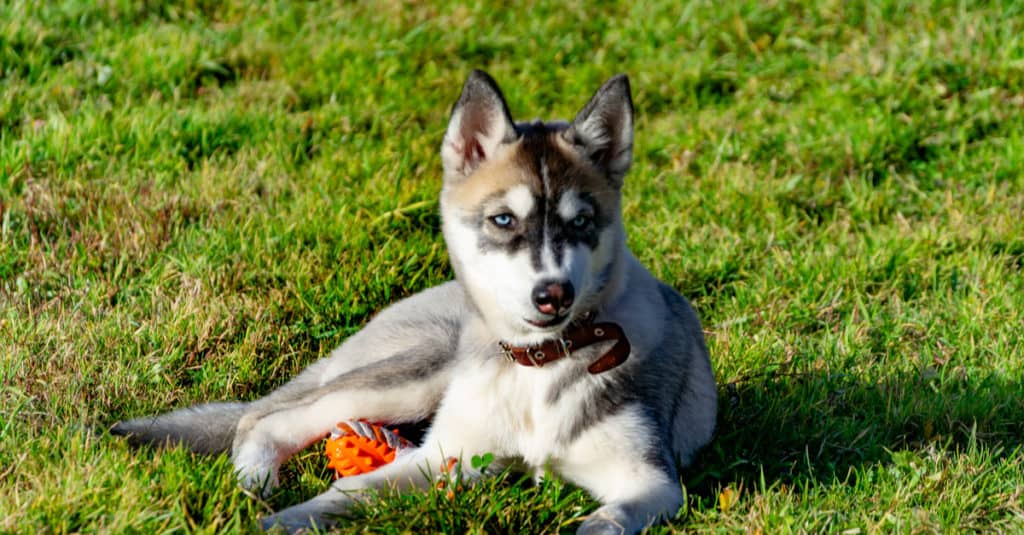
Miniature Husky dogs can be stubborn, which may make them difficult to train.
©Taisya Korchak/Shutterstock.com
Miniature Huskies are intelligent dogs, but they can often be difficult to train with their consistent stubbornness. As cute as their small stature is, they can be just as difficult to control as their larger counterparts.
Exercise
The miniature Husky is a very energetic breed, and they are usually the happiest with plenty of physical activity. It keeps them grounded and helps keep the destructive behavior at bay. Your pup would be happy to have a long yard space to run in. Taking them on one walk per day would do the dog well. In total, your pup should get more than 6o minutes of exercise per day.
While you leave them in the yard to run, keep the yard space closed – these small dogs are quite the escape artists. They often find a way to run away when they can. Their small size makes it easier for them to escape from places.
Puppies
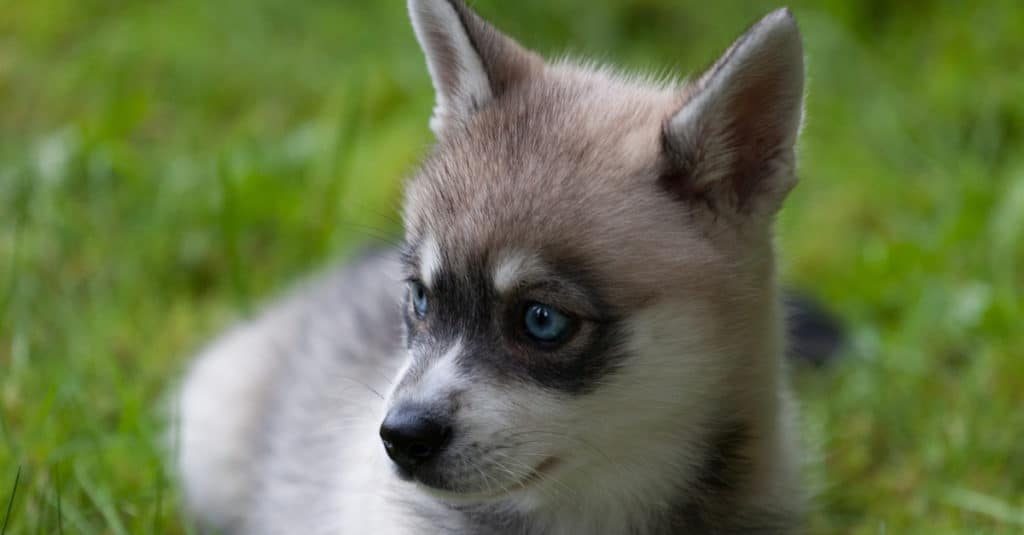
Miniature Husky puppies should be socialized at an early age.
©Harrison W Liu/Shutterstock.com
The average litter size for this breed is usually between 9 to 11 puppies. They are energetic and lovable. However, it is important to introduce them to social circles early on in life to promote good habits. Their meals should be divided into smaller portions to work with their small stomach.
Miniature Husky And Children
Miniature Huskies are very good with children. They are playful and energetic around them. However, it is important to not leave them unsupervised around children. They could end up hurting the kids or vice versa if left unsupervised in the house.
Similar Dogs
Here are the dogs similar to Miniature huskies:
- Akita – These dogs are very loyal to their owners and have a very friendly nature. They are also known to be courageous dogs.
- Northern Inuit – These dogs are friendly. They are also relatively healthier than most other dogs.
- Alaskan Malamute – These dogs are very intelligent and social just like. They are also very energetic and are affectionate.
Popular Names For The Miniature Husky
Here are some of the popular miniature Husky names:
- Clubby
- Pup
- Muffin
- Puffy
- Lamb
Famous Miniature Huskies
Even though several regular huskies are famous around the world for their appearances in the movies or their involvement in historical events. However, there are no known miniature huskies as of now.
View all 164 animals that start with MMiniature Husky FAQs (Frequently Asked Questions)
What is a Miniature Husky?
A miniature Husky is a smaller version of the normal Siberian Husky. They have the same personality traits as the regular huskies and require special grooming to avoid shedding.
How much does a mini Husky cost?
Miniature Husky puppies cost around $1500 to $2500. Over that, an additional price of $2000 annually for the dog’s maintenance needs can also be expected for these dogs.
Are mini Huskies good pets?
Yes, mini huskies make great pets. They are loving and energetic.
What is a mini Husky called?
The mini huskies are called miniature huskies and some people also confuse them with Alaskan Klee Kai that also have blue eyes like the miniature huskies.
Do miniature huskies shed a lot?
Yes, miniature huskies are known to shed a lot. The excessive shedding happens twice a year.
How big do miniature huskies get?
Male miniature huskies are usually 14 to 17 inches tall and weigh 25 to 35 pounds. Meanwhile, the female miniature huskies stand between 13 to 16 inches and usually weigh about 20 to 30 pounds.
Is miniature Husky good with kids?
Yes, these dogs are great with kids but they should not be left unsupervised around them.
How long does miniature Husky live?
The lifespan of Miniature huskies is about 12 to 15 years.
Thank you for reading! Have some feedback for us? Contact the AZ Animals editorial team.
Sources
- Perfect Dog Breeds, Available here: https://www.perfectdogbreeds.com/miniature-Husky/
- Pet Guide, Available here: https://www.petguide.com/breeds/dog/miniature-Husky/
- A-Z Animals, Available here: https://a-z-animals.com/animals/akita/

